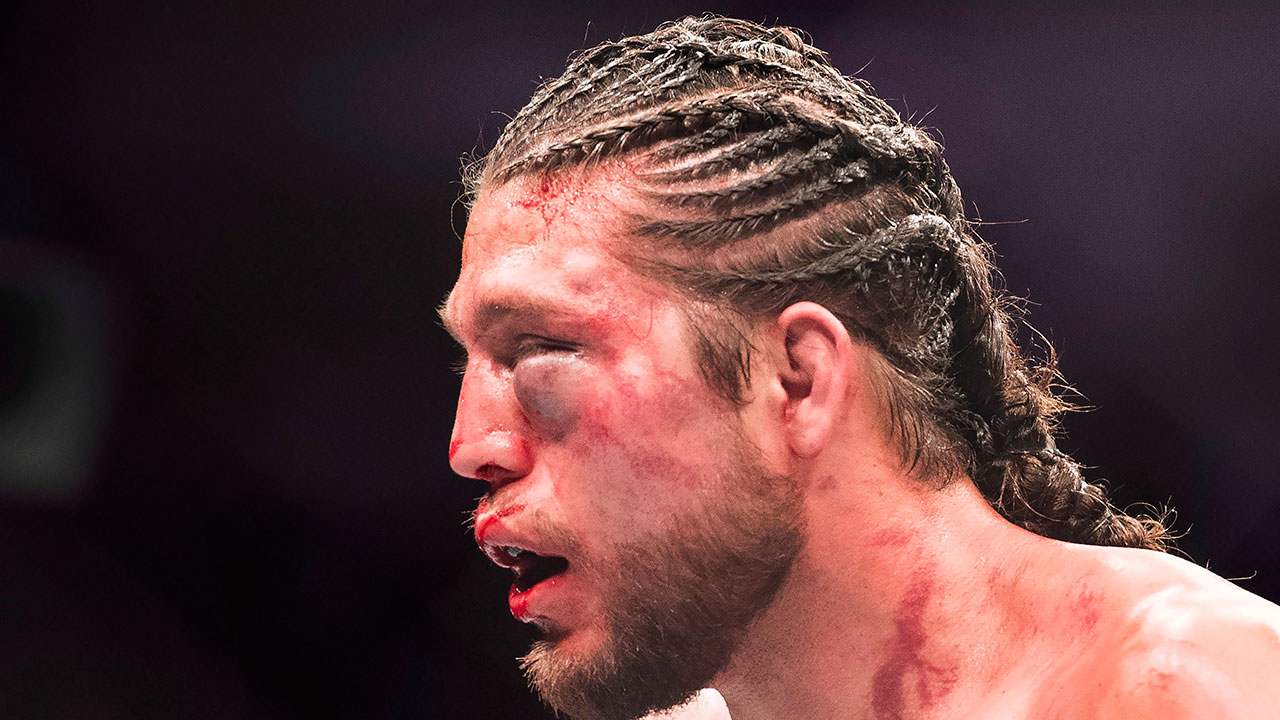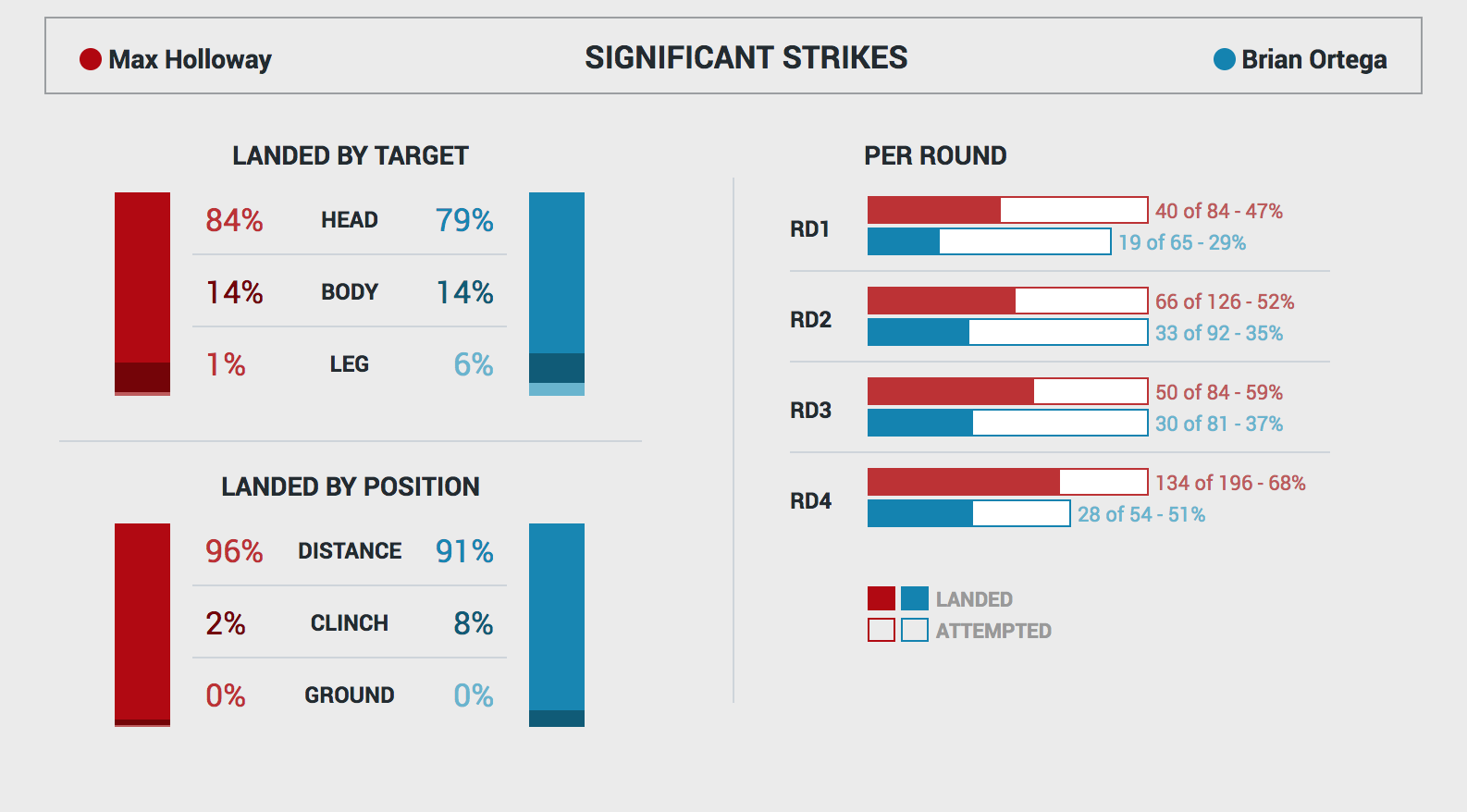TORONTO — The clues were there, if you wanted to look for them. The signs indicating that Saturday night’s featherweight title fight at UFC 231 was destined to end only one way. That it may not even be that competitive at all. That while both fighters are top of their class, one of them is in a class of his own.
His name’s Max Holloway, and he’s the greatest featherweight the sport’s ever seen. He proved it when he beat the legendary Jose Aldo twice, the second win even more decisive than the first. And he proved it again Saturday, returning after a year’s hiatus to put a lopsided performance on the plucky Brian Ortega, winning by doctor’s stoppage after four dominant rounds.
“I felt really good — I felt loose in there,” Holloway said. “I was talking to Joe Rogan. I saw my son, I was talking to him. My coaches were talking to me, I was talking back. I was talking to Ortega in there. I was talking to everyone. If I had a cell phone, I probably would’ve been texting someone. I was having the time of my life, man. I missed it.”
[relatedlinks]
It’s easy to say it now — but everyone should have seen this coming. Entering the night, Holloway had the second-best striking differential among UFC featherweights, and the most significant strikes per minute in the division. Ortega? His striking differential was dead last among ranked featherweights. And he’d absorbed the most significant strikes per minute of anyone in the division.
The ground discrepancy was just as stark. Ortega had completed only 14 per cent of his attempted takedowns in the UFC. Meanwhile, Holloway had defended 83 per cent of the takedowns attempted against him. It had been nine whole fights since Holloway was taken to the mat. His opponents were 1-for-37 over the prior 10 outings coming in.
So, should it have been a surprise to see Holloway land 59 per cent of his significant strikes, while Ortega landed only 37 per cent? To see Holloway stuff nine of Ortega’s takedown attempts, and easily escape the pair that he landed? Probably not.
Of course, what gave Ortega hope was the fashion in which his career had played out. Time and again, Ortega had been down on the scorecards before miraculously finding a way to pull out a last-minute victory. His first-round knockout of Frankie Edgar — who’d never been stopped in 28 UFC fights — was an outlier. In four of his five fights prior, Ortega had found his victory in the third and final round.
Still, that’s a cynical reading of Ortega’s six-fight stoppage streak that earned him the right to get pieced up by Holloway in the first place. If you’ve watched Ortega fight — watched him sink chokes that force panicked taps, watched him take opponents out of fights with powerful punches or knees — you know he wasn’t winning accidentally. The question was whether he could continue to afford giving opponents big early leads when he reached the highest echelon of his division.
The answer was he couldn’t. Holloway took the first two rounds decisively, and even though Ortega rallied in the third, the champion still won that round on all three judges’ scorecards. That set up a fourth in which Holloway stood right in front of Ortega and filled his opponent with strike after strike after strike. He’d told his corner after the third that he was ending it in the fourth. And he did absolutely everything he could to take Ortega out of the fight.

In a fight full of them, Holloway’s signature moment may have come in that fourth round’s latter half, when, seemingly tired of landing so many punches, he attempted a guillotine against one of the sport’s most dangerous jiu-jitsu players. Holloway couldn’t quite sink it, so he scrambled, leapt to his feet, and pointed at an exhausted Ortega as he summoned him off the mat. As soon as Ortega was back up, Holloway’s overwhelming flurries resumed.
Incredibly, Holloway’s volume increased as the rounds wore on. He landed 40 significant strikes in the first, 66 in the second and 50 in the third. Then, in a number that reads as a mistake but isn’t, Holloway landed 134 significant strikes in the fourth round. One hundred and thirty-four. That’s not normal. That’s not something that happens.

Credit Ortega, who ate that absurd amount of punches and kept coming back for more. The 27-year-old is too tough for his own good, and certainly would have walked out to the centre of the octagon for a fifth round if the doctor had let him. Thankfully, he didn’t. For a poor defensive fighter like Ortega, a five-round war with Holloway is the sort of thing that could change him forever. The four rounds he fought may have done so anyway.
But he needs to look no further than his opponent to see an example of how a fighter can return from great adversity. Holloway pulled out of three consecutive fights prior to Saturday, one with a leg injury, one when his extreme weight cut was deemed too dangerous to continue, and one when he began experiencing concussion-like symptoms during fight week. Holloway spent the lead-up to this fight telling anyone who would listen that the questions surrounding his health and ability were overstated. And then he went out and put on the performance of his life.
What’s next for him? Dana White’s made it abundantly clear he wants Holloway to move up to lightweight, where matchups with essentially anyone in the top-10 look incredible on paper. Imagine Holloway and Khabib Nurmagomedov finally sharing an octagon, as they nearly did this summer. Or Holloway and the eccentric Tony Ferguson throwing insane amounts of volume at one another. Or even Holloway and Nate Diaz exchanging slaps and long-range strikes.
There’s also a fellow by the name of Conor McGregor who you may have heard of. His featherweight win over Holloway in 2013 was the last time the current champion lost. Holloway was a much different fighter then — raw, inexperienced, not nearly as confident. Meanwhile, McGregor’s last vintage performance — a two-round deconstruction of Eddie Alvarez for the lightweight title — is now more than two years in the past. Considering how things have played out since they fought, a rematch between the two makes a great deal of sense.
But what makes the most sense to Holloway himself? Just beating whoever’s next. Beating the best. And being the best.
“I just want to be the pound-for-pound number one,” Holloway said. “I’m telling you guys, I’m setting the bar. And I dare you guys to catch me. Come get me. Come. This world’s already got one Max Holloway. So stop trying to be me. Be yourself. And come beat me. I dare you.”









